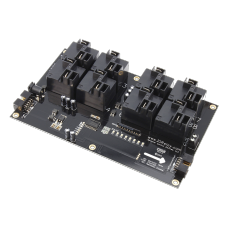Fusion Expansion High-Power Relay Controller 8-Channel
8-Channel High-Power Expansion Controller for Fusion Series Controllers
This Fusion 8-Channel High-Power Relay Expansion plugs into the Fusion FXR Relay Expansion Port to add more relays to your Fusion series dual interface relay controller. This controller includes 8 LED status lights and 3 connection points per relay. This expansion may be powered by a 2.1mm 12VDC barrel connector or via screw terminals for direct wired power installations. On-board switcher regulator power supply runs cool and provides plenty of power for the logic of this design. FXR expansion input and output connectors allow it to mix anywhere on the chain of relay expansion boards. Mix different types of relays as your application requires. Product Photo Shows Optional Metal Enclosure and Pluggable Connectors.
Fusion Expandability
Fusion Controllers know how to expand. Easily add Analog to Digital Converters, Contact Closure detectors, I²C devices, and a wide variety of sensors to meet your application objectives. The FXR Expansion Port allows you to also add expansion boards and control up to 256 relays.
Fusion Series Relay Controllers know how to connect to your application. With a simple point and click configuration, you can read a variety of sensors in just a few minutes. Fusion will automatically monitor your sensor in the background and make relay control decisions if a sensor is tripped or goes outside an acceptable range.
Fusion Series Controllers have 16 programmable I/O lines, which may be used for contact closure input, digital input, digital output, 8/10-Bit Analog to Digital Conversion, or I2C expansion. In most cases, these features may be mixed and matched as your application requires.
FXR Expansion Port
FXR Relay Expansion Controllers add a large variety of relay switching capabilities to an existing NCD Fusion series controller.
The FXR Expansion Port is used to add banks of external relays to a Fusion Controller. As we continue to develop new devices, a modular architecture will be implemented, offering the greatest amount of user flexibility.
Controlling FXR Expansion Banks
FXR Expansion Boards have no on-board brains. They are entirely reliant on the brains of a “master” Fusion device. The FXR Expansion Modules have many possibilities:
-
Adds up to 256 Relays to a Fusion Series Controllers
- Mix and Match Relay Types to Suite your Application Needs
- Choose Between Mechanical and Solid-State Relay Types
- Choose DPDT Relays for Signal Switching Applications
- Automate All 256 Relays for Automatic Control using Base Station
Linking FXR Expansion Boards Together
FXR Expansion Controllers consist of a FXR Input and FXR Output Connector. Simply connect the FXR Output of your Fusion Controller to the FXR Input located on the relay expansion board. Chaining more relays is easy. Simply connect the FXR Output of your Fusion expansion board to the FXR Input of your next relay expansion. Mix and Match different relay types as your application requires.
We always include the 6″ expansion cables with your expansion board. We can provide longer cables if needed, but it’s important to keep the cabling as short as possible. Not all users will be able to expand to 256 total relays, as it all depends on the installation, the amount of electrical interference, and the overall cable length. For best compatibility, the total length of the Fusion controller and all of the expansions and cabling should not exceed 1 or 2 meters.
20-Amp SPDT Relay Option
This controller is available with a 20-Amp relay option, allowing control of high-power loads up to an absolute maximum of 240VAC at 20 Amps. Ideal for high-power switching applications, this relay should never be used for low-power signals. The 20-Amp relay is of the SPDT variety, which provides Common (C), Normally Open (NO), and Normally Closed (NC) connections. Common is connected to NC when the relay is off. Common disconnects from NC and connects to NO when the relay is activated. This relay uses .250″ Quick Connect terminals (optional accessory) to connect to the top side of the relay. The relay is molded with COM, NC, and NO markings into the plastic.
30-Amp SPST Relay Option
This controller is available with a 30-Amp relay option, allowing control of high-power loads up to an absolute maximum of 240VAC at 30 Amps. Ideal for high-power switching applications, this relay should never be used for low-power signals. The 30-Amp relay is of the SPST variety, which provides Common (C) and Normally Open (NO) connections. Common has no connection when the relay is off. Common connects to NO when the relay is activated. This relay uses .250″ Quick Connect terminals (optional accessory) to connect to the top side of the relay. The relay is molded with COM, NO markings into the plastic.
Features
- 8-Channel SPDT 20 or SPST 30-Amp Relay Expansion Board
- SPDT Relays Include 3 Connections per Relay
- SPST Relay Include 2 Connection per Relay
- Mix and Match Different Relay Expansion Types
- Compatible with all Fusion Series Controllers
- Connects to the Fusion FXR Relay Expansion Port
- Control Up to 256 Relays Using the FXR Expansion Port
- On-Board Relay Status LEDs Indicate On/Off Relay Activity
- 12 Volt DC Operation Requires External Power Supply
- Powered using a 2.1mm Barrel Connector or Screw Terminals
Enter the code in the box below:




